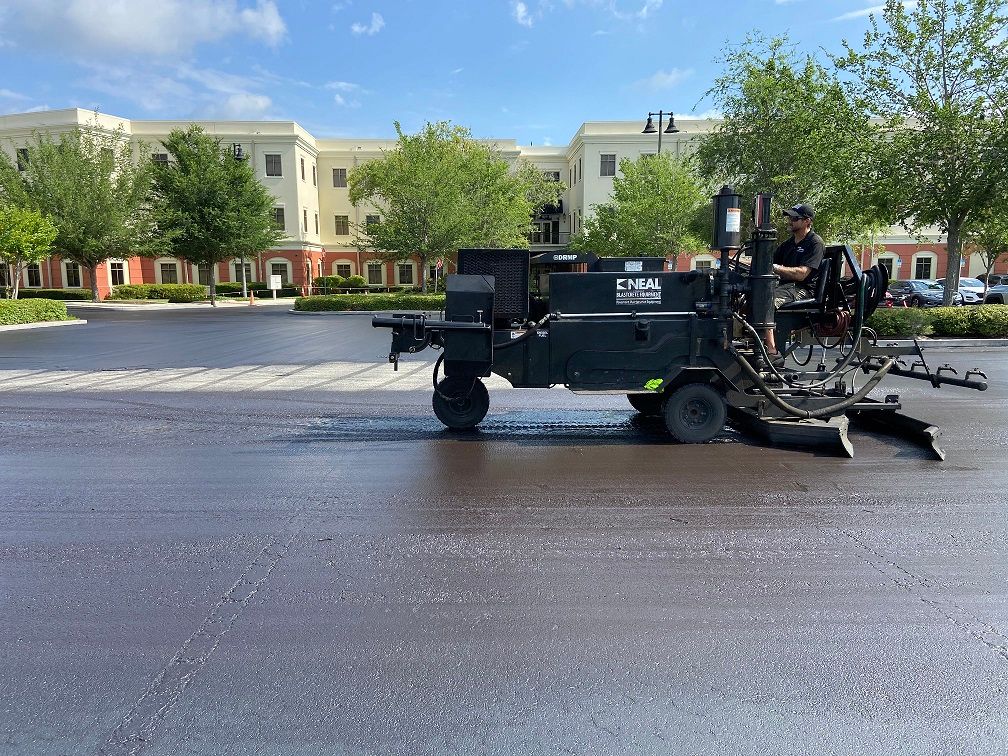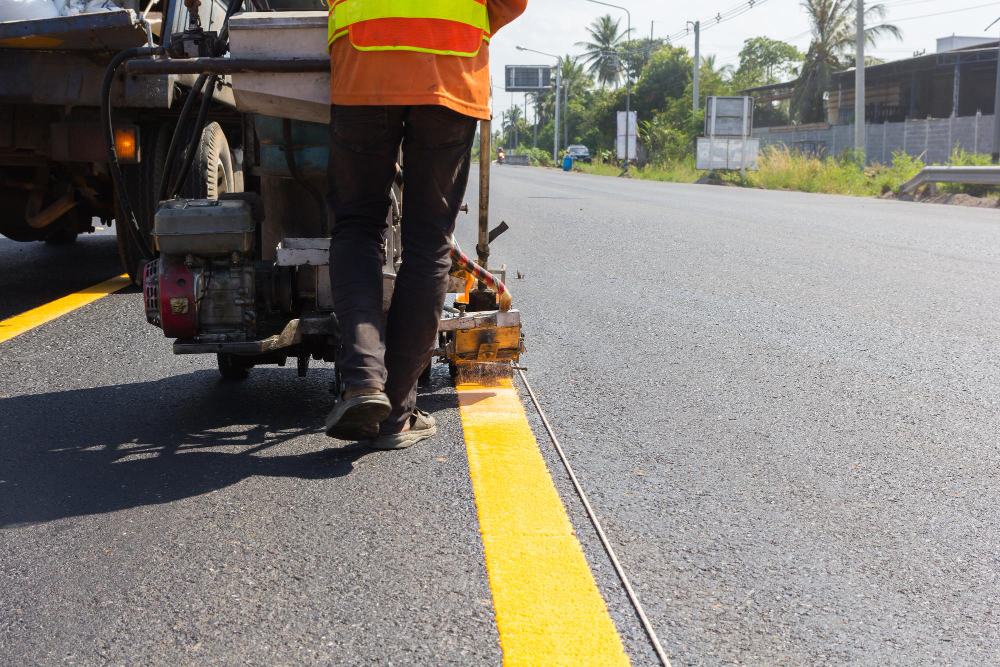

Clear, well-maintained parking lot lines aren't just about aesthetics—they're crucial for safety, compliance, and creating a positive first impression for your business. Whether you're a property manager, business owner, or contractor considering taking on striping projects, understanding the equipment involved helps you make informed decisions about maintenance and costs.
Professional parking lot striping requires specialized tools and materials to achieve durable, straight lines that withstand weather and heavy traffic. The right equipment makes the difference between a job that lasts years versus one that fades within months. Let's explore the essential equipment needed to create parking lot striping that meets professional standards.
The foundation of any striping project lies in choosing the right paint and marking materials. Professional-grade paints differ significantly from standard paints in durability and visibility.
Water-based acrylic paint serves as the most common choice for parking lot striping. This paint dries quickly, typically within 15-30 minutes, and provides good durability at a reasonable cost. It works well in most climates and offers excellent color retention.
Solvent-based paints deliver superior durability and work better in extreme weather conditions. While more expensive than water-based options, they last longer and maintain their appearance even under heavy traffic.
Thermoplastic materials represent the premium option for high-traffic areas. Applied using heat, these materials create extremely durable lines that can last 3-5 years with proper application.
Glass beads enhance nighttime visibility by creating retroreflective properties in painted lines. These tiny spheres reflect vehicle headlights back to drivers, improving safety during low-light conditions.
Anti-skid additives help create texture in painted lines, reducing slip hazards in wet conditions while maintaining the paint's appearance and durability.
Professional striping machines ensure consistent line width, paint thickness, and straight application—qualities impossible to achieve with manual methods.
Self-propelled walk-behind units work well for most parking lots and offer good control for detailed work around obstacles. These machines typically handle line widths from 2-6 inches and can paint at consistent speeds of 3-5 mph.
Push-type walk-behind stripers cost less but require more physical effort. They work well for smaller projects or areas where precise control is needed.
Larger parking lots benefit from ride-on striping machines that cover ground quickly while maintaining professional results. These units often include GPS guidance systems for perfectly straight lines and can handle multiple colors simultaneously.
Truck-mounted systems represent the most efficient option for large commercial projects. These setups include heated tanks for thermoplastic application and can stripe thousands of linear feet per hour.
Proper surface preparation determines how well paint adheres and how long the finished lines will last.
High-pressure washers remove dirt, oil stains, and loose debris that prevent paint adhesion. Commercial units producing 3,000-4,000 PSI ensure thorough cleaning of asphalt surfaces.
Hot water pressure washers work more effectively on oil stains and stubborn contaminants, though they require more setup time and fuel consumption.
Melter/applicator units heat rubberized crack filler to the proper temperature for sealing cracks before striping. Filling cracks prevents moisture infiltration that can cause paint failure.
Direct-fire melters offer faster heating times but require more safety precautions, while oil-jacketed units heat more evenly and maintain consistent temperatures.
Wire brushes and scrapers remove old paint remnants and surface contaminants. Power wire brushes attached to angle grinders speed up the removal process for large areas.
Leaf blowers clear loose debris from the striping area immediately before paint application, ensuring optimal paint adhesion.
Accurate measurements and layout ensure compliance with ADA requirements and local regulations while maximizing parking space efficiency.
Steel measuring tapes of 100-300 feet handle most parking lot measurements. Fiberglass tapes work better in windy conditions but may stretch over time.
Measuring wheels provide quick distance measurements for large areas and help calculate paint quantities needed for projects.
Chalk line reels create temporary guidelines for straight line application. Blue chalk works well for most surfaces, while red or yellow chalk shows up better on darker asphalt.
String lines with stakes provide more permanent guidelines for complex layouts or projects that span multiple days.
Pre-made stencils ensure consistent lettering and symbols for handicap spaces, fire lanes, and directional arrows. Professional stencils use durable materials that withstand repeated use and cleaning.
Custom templates help create consistent curved lines or unique markings specific to particular properties or requirements.
Professional striping requires attention to safety for workers and quality control for consistent results.
High-visibility clothing keeps workers safe around vehicle traffic. Class 2 or Class 3 safety vests meet OSHA requirements for roadway work.
Traffic cones and barricades control vehicle access during striping operations. Reflective cones with weighted bases resist wind and vehicle disturbance.
Line width gauges verify that painted lines meet specification requirements. Consistent line width contributes to professional appearance and regulatory compliance.
Wet film thickness gauges ensure proper paint application rates. Too little paint reduces durability, while excessive paint wastes materials and may cause poor drying.
Professional parking lot striping requires significant equipment investment, technical knowledge, and experience to achieve lasting results. The complexity of coordinating multiple tools, materials, and safety requirements often makes professional services more cost-effective than attempting DIY approaches.
If you need professional parking lot striping in Sanford FL, contact Florida Sealcoating today for free estimates Professional contractors bring the right equipment, materials, and expertise to ensure your parking lot meets all safety and compliance requirements while creating a positive impression for your business.
Get a free, no-obligation estimate for your asphalt project. Our team is ready to help protect and enhance your property.
(407) 942-3681